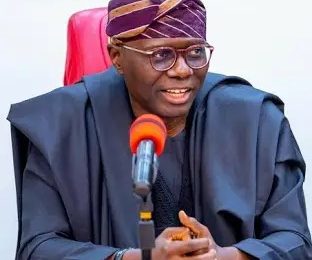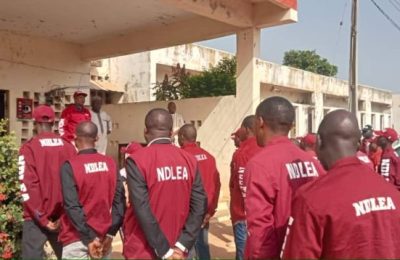The Holy Bible in the book of Genesis, Chapter 1, verses 1-3, said: “in the beginning, God created the heaven and the earth. And the earth was without form and void. Darkness was hovering upon the face of the deep”, like a state of ebullition.
Aghast by this commotion, the Spirit of God descended upon the waters and He pronounced “let there be light, and there was light”. There wasn’t any magic behind this as people erroneously thought. It was a product of deep thinking, planning and right conscience, to offer solace to humanity.

With the humongous investment Ekiti State is currently making to up the ante in electricity generation, it seems Governor Biodun Oyebanji has been possessed by “let there be light” spirit. This could be premised on the fact that extending stable electricity to all the 140 Ekiti towns is now his major preoccupation and cardinal agenda.
When he assumed office two years ago, many towns were locked in total power outage. There was no nightlife, ditto flourishing economy. Insecurity spiralled like a bush fire in the harmattan. The local economy was comatose and poverty soared to an alarming and tremulous dimension. But, when the righteous are in power, the people rejoice. This is exactly the case of Ekiti State currently.
Shrewd and apt enough, ‘Infrastructure and Industrialisation’ is one pillar in the policy-thrust of Oyebanji’s administration. But nobody knew the magic wand he wished to wield to industrialise the state. He had a focus and this is steadily gaining momentum and manifesting in folds and mileages.
As a rational leader and thinker that he is, Oyebanji believed electricity is sine qua non to industrial growth. He refrained from signing flippant and implausible Memoranda of Understanding with private organisations that can offer no solution. He was pragmatic in approach. He concentrated on rural electrification to buoy the economy and things are gradually taking a new shape.
Oyebanji didn’t just accomplish this by happenstance. He planned for it as God did at the beginning of creation. He knew Ekiti is financially lean and limited. Rather than splurge on fleet of cars and frolic around in pleasure, he let go of his personal comfort for the sake of humanity. He made rural electrification a priority and cornerstone of industrialisation. Good enough, this is yielding bountiful results.
Before he sauntered into governance as the Chief Executive, many local governments had experienced decades of power outage. Those with electricity got a paltry supply of one or two hours daily. Supply in some areas was gruesomely interrupted with no positive effect on the growth of the small and medium scale enterprises.
As frightening as the above situation was, it was astounding that Oyebanji has succeeded in reconnecting over 40 towns back to the national grid to propel the local economy. Little wonder, he is enjoying solid and invincible cult-like support among the artisans and traders.
It sounded incredible, but it has happened. All the towns in Ayekire and Ekiti East Local Governments, Ogotun, Ikogosi, Erinjiyan, Igbara Odo, Ilawe, Irewumi, Orungbe, Olorunsogo, Surelere, Olorunda, Ijadu, Ijero, Aramoko and other communities won’t forget how the current government elevated their economic wellbeing and restored power to their domains.
What the governor did was wondrous in these towns. He extended the 33KVa connection from Aramoko to Ijero and its suburbs to halt the dependence on electricity from Kwara State that had not served well. The same magical initiative was adopted through extension of 33KVA line from Ado Ekiti to Ilawe, Ogotun, Igbara Odo and Ikogosi Ekiti, that had previously been receiving poor supply from Ondo State for many decades.
It was a well publicised news, though sad, that Gbonyin and Ekiti East councils were plunged into darkness for over a decade. In a wondrous fashion, the governor reconnected the towns and replaced damaged transformers in some places. Some sections of Ikere, Ado Ekiti and scores of communities had received transformers to power their light and ensure stability.
From inception, his mission was clear and lucid. Oyebanji identified MSMEs as the power house of any developing economy. Looking at Ekiti’s economic space, the informal sector controls over 60 percent; lives and livelihoods in this sector rest on the fulcrum of electricity supply.
As earlier said, this government came with a focus and mindset to radicalise the electricity system. It began by breaking the cartel and monopoly of the Benin Electricity Distribution Company (BEDC) in power policy. He did this by craftily creating Ekiti State Electricity Regulatory Bureau, to partner the BEDC in decision making. This has really paid off. Putting it in proper perspective, Ekiti is the second state to have its own electricity regulatory body in Nigeria.
Speaking while commissioning the 33 KVA extension to Ijero town, Oyebanji, disclosed that he had connected over 40 towns to the national grid, since assumption of office two years ago. This was with intention to upscale local economy and add modern touch to the grassroots.
Oyebanji said he decided to extend electricity and erect solar lighting in some places to increase nightlife and bring an upswing to the economic development of the populace.
“In the last 24 months, I have connected over 40 towns to national grid. Some were reconnected after decades of power outage, while some never had light at all. No town can develop without electricity and to develop the local economy, we are focusing on grassroots electrification to boost our economy at the rural level.
“Electricity and roads are very central to development and we will continue to connect as many as possible towns with electricity and roads. Any town without good roads and power will be in darkness and no development can take place,” he said.
Oyebanji was emphatic and unambiguous in his message that no community can experience development while in perpetual darkness, or mired in interrupted power supply.
He was, however, not oblivious of the activities of vandals. At every opportunity, he urged the communities to mount surveillance and prevent vandals from carting away their accessories.
“Light and development are like Siamese twins. Any town without electricity will find it difficult to develop. Our traders, fashion designers, welders, bakers and other artisans will enjoy the full benefit and our local economy will be transformed. Some of the teachers and doctors posted here won’t seek posting to other towns that are electrified.
“For you to enjoy these facilities, form a surveillance and watch over it. Don’t allow vandals to destroy it. Those who are destroying our facilities are living within us. They are our people, so help us beg and appeal to them to desist from this unwholesome act. This project is not going to benefit Ijero alone, but all the towns in the local government,” he said.
For full utilisation of the current gains, Oyebanji promised to extend uninterrupted electricity supply to all the 22 General Hospitals in the state, so that supplies to Ekiti provided can fully serve the purpose for which it is meant for.
In fact, the top echelon of the power distribution company, BEDC, was dazzled by Oyebanji’s interest in power sector. The BEDC Regional Head, Mrs Akin Afuye-Moyosola, applauded the governor for partnering the firm to extend electricity to some towns. She said this will boost local economy and smoothen the company’s operations in Ekiti.
Prominent traditional rulers were full of praises to the governor on his achievements in power sector. The chairman of the council of traditional rulers, Oba Ilori Faboro Ajero of Ijero, Oba Joseph Adewole, and Onijan of Ijan Ekiti, Oba Adebanji Aladesuyi, commended the governor’s initiative.
The revered traditional rulers appealed to the communities to protect the infrastructure from vandals, so that they can enjoy its full benefits. They expressed joy over sudden positive changes in the lives of their subjects with the new trend of electricity restoration, especially in combating poverty and insecurity.
Also lending their voices to the torrent of commendations, the Alawe of Ilawe Ekiti, Oba Adebanji Alabi, and Arajaka of Igbara Odo, Oba Edward Jayeola, said the communities will continually support Oyebanji to make a success of his six-point agenda.
With the current upsurge in investment and electricity supply in Ekiti, the “let there be light policy” is real and the wind has started blowing across the towns, giving hope that the state is steadily marching to greatness under Oyebanji’s leadership.
Remarkably, the state is on the march towards achieving energy independence. The governor recently granted operational licenses to 14 electricity investors, which include: three distribution companies; four generation companies; two mini-grid generation companies, and five meter asset providers.
This strategic move is expected to enhance power generation, ensure efficient distribution, and provide reliable metering for our residents.
Currently, Ekiti receives approximately 20-25 MW from the national grid, which falls short of the estimated requirement of 120 MW. The goal is to reach 130 MW through a robust state grid, reducing dependency on the national supply and promoting sustainable, locally managed energy solutions.
This initiative aligns with the 2023 Electricity Law Enactments, which empower states to decentralise electricity markets and license providers to better meet local needs.
Ogunje is Special Assistant (Media), Office of the Deputy Govenor
Read Also: Women Affairs Minister vows to sustain campaign against GBV







